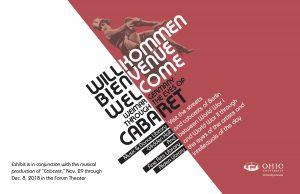

The College of Fine Arts will be performing a rendition of the classic 1966 musical, “Cabaret” from Nov. 29 to Dec. 1 and Dec. 4 to Dec. 8. The musical, which will take place in the Forum Theater, was adapted from a novel written by Christopher Isherwood titled, “Goodbye to Berlin.”
In celebration of the performance, the Libraries will have an accompanying exhibit titled, “Willkommen, Bienvenue, Welcome: Weimar Germany Through the Eyes of Cabaret” beginning on Nov. 16. The exhibit will provide historical context for the musical production.
According to History.com , the Weimar Republic was Germany’s government from 1919 to 1933, the period after World War I until the rise of Nazi Germany. As stated in an article published by Encyclopedia Britannica , by the late 1920s the cabarets, or nightclubs, that existed in the Weimar Republic had come to feature mildly risqué musical entertainment, as well as political and social satire. It was also a center for underground political and literary movements, especially leftist opposition to the rise of the German Nazi Party.
“What we want to do is show the time period that Cabaret is situated in during the Weimar period in Berlin, Germany,” said Carla Williams, music and special projects librarian and interim co-department head of arts and archives. “We’ll be looking at art, dance, music and cabarets themselves, as opposed to the musical, including some of the decadence that was going on at the time.”
The exhibit will be held in two locations: The Music and Dance Library in Glidden Hall and the Frederick and Kazuko Harris Fine Arts Library in Alden Library. lorraine wochna, subject librarian for performing arts, said that having two locations helps faculty and students become more familiar with the Music and Dance Library.
“It will help raise awareness of the collections at the Music and Dance Library, as well as serve as a collaborative effort between Alden Library and the music Library,” wochna explained. She also discussed how the production of the musical will bring students from the music, theater and dance division together in what she describes as a “College of Fine Arts extravaganza.”
The general theme of the exhibit is centered around capturing the spirit of Weimar Germany through the eyes of Cabaret, and particularly through the arts. According to Michele Jennings, art librarian, the goal of the exhibit is to, “…celebrate the performance of Cabaret and consider artistic production in Weimar Germany.”
The exhibit will feature books from the Fine Arts collection highlighting work from the artists that defined the attitudes and movements of interwar Germany, costume and set props from the productions and sheet music from the era. Williams said that the exhibit will enhance the experience for those who plan to see the musical.
“We are so excited for the community to experience the production and gain a greater understanding of the unique spirit of Weimar Germany through this exhibit,” Jennings added.
Williams, wochna and Jennings, curators of the exhibit, encourage anyone who might be interested in Cabaret to attend the show and view the exhibit. Williams said she is hoping for positive feedback and for people to let her know what other exhibits they would like to see in either space.
